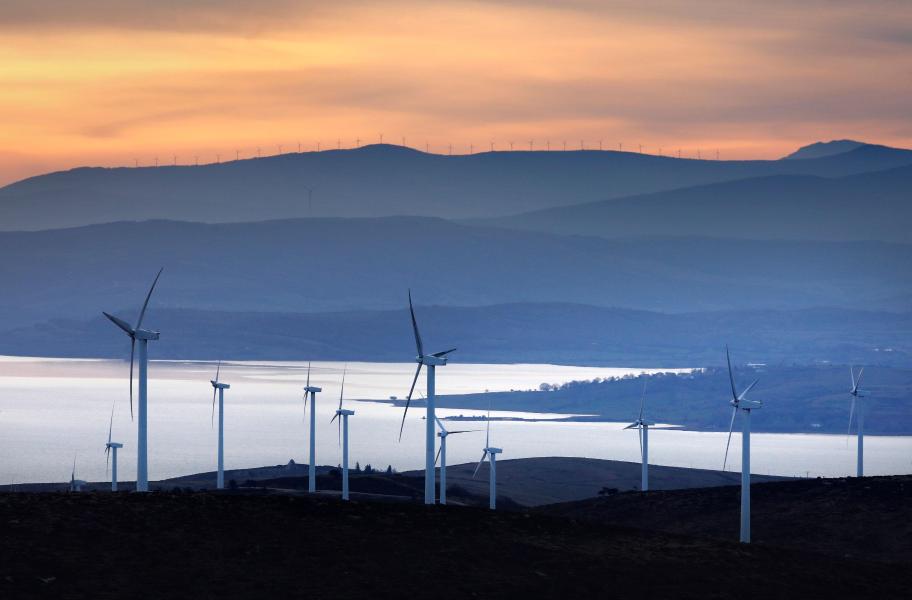
- The Buniel wind farm in the province of Burgos will have an installed capacity of around 100 MW, enough to generate clean energy for 69 700 households.
- As one of the largest wind farms in Castilla y León, it will prevent 90 000 tonnes of CO2 emissions a year.
- The project supports the REPowerEU plan to end Europe’s dependence on Russian fossil fuel imports and accelerate the green transition.
The European Investment Bank (EIB) has signed a €55 million green loan for a joint venture between Iberdrola (75%) and Caja Rural de Soria (25%) which will be used to build one of the largest wind farms in the Castilla y León region, in Spain.
The Buniel wind farm in the province of Burgos will have a total installed capacity of around 100 megawatts (MW), enough to power around 69 700 households with clean energy. The renewable power produced will prevent 90 000 tonnes of CO2 emissions a year.
The total investment cost of the project is approximately €100 million. The facility will boost the economy in rural areas of Burgos, creating up to 200 jobs during the construction stage and around ten positions during operation.
As the project is located in Castilla y León, which is a designated EU cohesion region, it contributes to the EIB’s regional development objectives. The EIB prioritises projects in regions with a gross domestic product (GDP) per capita below the EU average.
“We are pleased to be financing this wind farm, which is unique in many ways and will add an installed capacity of around 100 MW,” EIB Vice-President Ricardo Mourinho Félix said. “It will drive economic growth and employment in an EU cohesion region such as Castilla y León, and contribute to the climate goals of Spain and Europe.”
Chief Executive Officer of Iberdrola Spain Mario Ruiz-Tagle added: “Spain has great potential when it comes to renewable energy. With initiatives like this, we can help our country become a leader in the sector, facilitating investments that promote the transition towards an economy that is less dependent on fossil fuels, while also creating economic growth and employment.”
President of Caja Rural de Soria Carlos Martínez Izquierdo, who is also president of the joint venture promoting the wind farm, highlighted “the importance of having a presence in the local economy — an economy linked to renewable energy, in which we already have over 25 years of experience. And it all started in Soria. Investing in ‘energy freedom’ makes us more economically stable as a country. This issue has really come to the fore amid the current geopolitical situation, which has become so acute that it has pushed the need for clean, local energy to the very top of the agenda.” He also added that “the turbines were almost completely designed and manufactured in Spain, and were actually assembled in Castilla y León, in Ágreda, Soria.”
This operation contributes to the energy policy priorities of the European Union and Spain. It supports the European Commission’s REPowerEU plan unveiled in May 2022, which aims to accelerate the green transition and end Europe’s dependence on Russian fossil fuel imports. In Spain, the project will also help to achieve the country’s 42% renewable energy target for 2030 under the 2021-2030 integrated national energy and climate plan.
The financing is classified as an EIB green loan as it fully complies with the climate action and renewable energy eligibility criteria. The features of the loan mean that it also fully meets the requirements of EIB Climate Awareness Bonds on the green loan market. This transaction is therefore likely to be allocated to the EIB’s portfolio of lending operations financed by the issuance of such bonds.
Background information:
The European Investment Bank (EIB) is the long-term lending institution of the European Union owned by its Member States. It finances sound investments that contribute towards EU policy goals.
The EIB and energy security
Over the past decade, the European Investment Bank Group has channelled almost €106 billion into the European Union’s energy sector. These vital investments are now helping Europe weather the crisis triggered by the abrupt cut in Russian gas supplies. In 2022 alone, the EIB signed financial support totalling more than €17 billion for projects in energy efficiency, renewables, electricity and storage in the European Union, thus helping to strengthen the resilience of the European economy.
In October 2022, the EIB Board of Directors decided to raise the Group’s clean energy financing volumes to unprecedented levels in support of the REPowerEU objective of ending Europe’s dependence on Russian fossil fuel imports. Over the next five years, an additional €30 billion will be invested on top of the EIB’s already robust support for the EU energy sector. The REPowerEU package is expected to generate an additional €115 billion in investment by 2027, thus making a substantial contribution to Europe’s energy independence and to the EIB Group’s target of mobilising €1 trillion in climate finance this decade.
Find out more about the EIB’s support for the energy sector here and about the latest energy projects we have financed here.
Iberdrola reaffirms its global leadership in green finance
Iberdrola is rolling out its sustainability strategy, which is based on the electrification of the economy. The strategy focuses on mitigating climate change and creating wealth and jobs in the regions where Iberdrola operates.
This funding will enable the company to further strengthen its leading position in sustainable financing. At the end of September, Iberdrola’s net debt amounted to €44 293 billion: the current green bond operation worth over €16 billion; around the same amount in environmental, social and governance credit lines; €5 billion in commercial paper; and around €3 billion in loans and structured financing. All of this is sustainable.
The projects funded with this kind of financing are in line with the following UN Sustainable Development Goals on which Iberdrola is focusing: SDG 7 (affordable and clean energy) and SDG 13 (climate action).